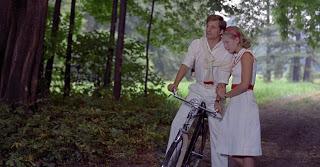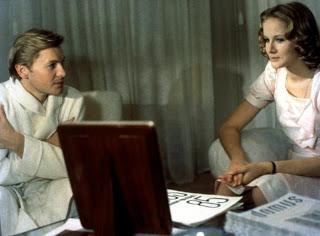
"In order to really understand the world, you must die at least once."
Over time, Vittorio de Sica drifted from his neorealist roots, gravitating towards broad comedies of varying quality (Marriage, Italian Style, A Place for Lovers). The Garden of the Finzi-Continis (1970) ranks alongside Bicycle Thieves as his best movie, a high-toned, low key heartbreaker exploring Jewish life under fascism.In 1930s Ferrara, the wealthy Finzi-Continis isolate themselves on their spacious estate, fleeing encroaching anti-Semitism. Giorgio (Lino Capolicchio), a childhood friend of the family, visits the estate with friends to play tennis and pursue a romance with Micol (Dominique Sanda). Micol resists his advances, tending instead to her sickly brother Alberto (Helmut Berger) and leaving Giorgio perpetually frustrated. Giorgio finds himself increasingly targeted by Mussolini's regime, while World War II causes the Finzi-Continis' world to come crashing down.
Adapting Giorgio Bassani's novel, de Sica eschews the debauchery of antifascist contemporaries like Bertolucci and Visconti. Instead, The Garden of the Finzi-Continis opts for refined elegance, with Ennio Guarnieri's photography capturing a verdant, lively estate too beautiful to be real. Gorgeous shots of white-clad teenagers bicycling through the Finzi grounds contrast with Giorgio's depressed life in Ferrara, skulking in an apartment and prowling dingy carnivals. Along with Manuel de Sica's emotive piano-and-string score, it's melancholy and evocative.
Much of Garden is a star-crossed romance with a difference. Micol initially indulges Giorgio's affections but finds her feelings waning over time; ultimately, she considers herself too close to Giorgio for a meaningful relationship. Giorgio is the deathless Nice Guy, thinking his earnest kindness entitles him to sex. Even after she takes a lover, he won't take a hint. Their relationship climaxes with an awkward encounter bordering on attempted rape. Frustrating though it is for Giorgio, it also grants Micol agency by choosing her own path.
Then again, Micol's chosen path amounts to escape from reality. The Finzi-Continis literally wall themselves off from society, playing tennis, listening to jazz records and even recreating Micol's old school in miniature, while Giorgio deals with discrimination and daily indignities, like being booted from a library or scuffling with Blackshirts in a movie theater. His father (Romolo Valli) tries accommodating the regime with a complacency that frustrates his son; Italian Jews have lost all their rights, he reasons, but at least they're citizens!

While de Sica seeds Garden with metaphor and class allegory, it never delves into the mean-spirited caricatures of something like 1900. The Finzi-Continis are guilty of not facing facts but seem neither cruel nor repressive; on their own Micol and her brother, who wrestles with his own unrequited feelings for Malnate (Fabio Testi), receive sympathy equal to Giorgio's working class family. Ultimately, the film embraces fascism as universal tragedy, with Jews of all classes and background equally victimized.
De Sica assembles an impressive cast, with Lino Capolicchio making a doggedly earnest, tormented lead. Dominique Sanda performed in The Conformist the same year: her sensitive characterization is remarkably different. Similarly, Helmut Berger's repressed, endearing Alberto is worlds away from his sneering Nazi transvestite in The Damned. Romolo Valli provides emotional heft as a middle-aged Italian who wants the nightmare to end. Fabio Testi later became a star of Spaghetti Westerns and action films.
The Garden of the Finzi-Continis seems almost anomalous among its contemporaries: rather than feverish imagery, sexual perversion and Marxist pomposity, it opts for quiet, humanist tragedy. At film's end, the Finzi-Continis lose everything - their money, their estate, even Micol's loyal dog - just like Giorgio's family: fascism becomes an unwitting leveler.

